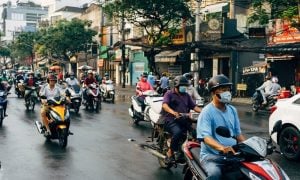Learn the dos and don’ts in Vietnam to integrate into the local culture and daily life quickly.
Vietnamdrive’s team selects the top things to pay attention to out of various taboos and dos. Let’s check them out!
1. The top 11 don’ts in Vietnam
1.1. When you meet a cute-looking baby, do not compliment the baby with words such as adorable, beautiful, or chubby.
Many people think that this goes against the rules of communication. In reality, communication has become regulated again in Vietnamese life.
According to the beliefs of most Vietnamese mothers, praising their babies for being fat and beautiful can bring bad luck to them.
Problems can come after compliments, such as illness, anorexia, etc. Because of that concept, it’s better not to compliment any child you see!
1.2. Wearing clothes that are too short when visiting temples, pagodas, or spiritual places is not recommended.
For Vietnamese people, these places are considered sacred places. Therefore, to ensure respect, remember not to wear short, skin-revealing, or impolite outfits when going to these locations.
1.3. Don’t sit too long in local restaurants.
Vietnamese people go to restaurants only to enjoy food. They go to cafes or pubs when they need space to sit together or discuss issues.
Therefore, sitting too long in a local restaurant often does not satisfy the owner. If you need to sit longer than usual to discuss something with your friends, please go to a cafe or a restaurant specializing in serving tourists!
1.4. Don’t ask about magical feng shui items that Vietnamese people hang in their homes, such as paper talismans or bagua mirrors on the door.
From an Asian point of view, every house needs to follow specific feng shui rules. If, unfortunately, the house commits some bad points, they will use feng shui items to neutralize, ward off, or exorcise evil spirits.
The owners want people to refrain from asking about those items. They believe that asking about the talisman will decrease its effectiveness.
1.5. Do not bring flowers when visiting families who have just given birth.
Vietnamese people believe that flowers bring many lucky and fresh colors. At the same time, they are also an indispensable offering when offering and commemorating the deceased.
When a woman gives birth, she faces many risks, life-threatening. Therefore, any action that creates associations with death is avoided. Bringing flowers to the house of a person who has a new baby also becomes a taboo in Vietnam.
1.6. Do not wear a lot of jewelry when going out.
This issue is not related to any cultural or spiritual concept. But simply for your own safety. When you carry too many valuables on your body, you can become a target of rogue social elements. Therefore, to avoid being robbed or pickpocketed, you should only wear jewelry that has purely aesthetic value; it is not valuable – such as gold.
1.7. Be careful with ice dishes.
Vietnam is located in a tropical climate zone. Winter is not too cold, and summer is long and hot. Therefore, ice has become an indispensable ingredient in many tasty dishes and drinks, such as tea, sugarcane juice, soft drinks, beer, coffee, etc.
However, we advise you to be careful with this issue of hygiene and safety for this type of food. This attention will help your stomach avoid some unnecessary trouble during your trip.
1.8. Do not speak bad words to Vietnamese people or certain customs in front of a Vietnamese person.
This taboo may appear in many countries or people, not just Vietnam. But something interesting here is that Vietnamese people sometimes still have the habit of saying tough things to each other.
However, they do not accept bad words directed at any Vietnamese person from a foreigner. So, if you accidentally stand between two Vietnamese people talking badly about each other, it’s better to avoid this conversation.
1.9. Avoid giving large denominations to pay for small payments.
No matter what item you choose, the seller will welcome you, whether it has a high or low price.
However, using large denominations to pay for small amounts, such as 500,000 VND for something under 50,000 VND or 200,000 VND for items under 20,000 VND, can make the seller uncomfortable and troublesome.
They may prefer to avoid calculating and returning a large amount of change because this can easily cause confusion and chaos. Thus, preparing a few small Vietnamese banknotes is ready to use when paying for a water bottle, for example.
1.10. Don’t ask about political views because it can lead to unnecessary arguments.
Each individual, nation, and country has its own options on political issues. You may be curious about the political regime in the country you are visiting.
However, to make every moment of your vacation enjoyable, you should only ask a little about this issue with any local people, even your tour guides; although they can answer you, it’s not a good idea to do so.
1.11. The national flag and President Ho Chi Minh are always sacred symbols of Vietnam.
Therefore, when traveling to this country, you should never disrespect the Vietnamese national flag and the image of Uncle Ho Chi Minh. Not only does it cause you to face unpleasant looks and anger from people, but you also have to get into trouble with the local government.
2. The top dos in Vietnam
2.1. Bring a small gift when visiting someone else’s home.
Bringing a gift is not required. However, a small gift, such as candy or chocolate for children and a delicious tea package or a fresh fruit basket for older people, is always a good thing to do.
A gift is a way to show your care to the family members you visit. It not only brings joy to the homeowner but also tells your courtesy.
2.2. Ask in advance for all services from restaurants to taxis.
Local authorities strictly try to control unreasonable price gouging and fraud; however, occasionally, a few rogue cases still take advantage of tourists’ confusion to make illegal profits.
It is better to ask the price of all the services you want to use, which can help you avoid the unpleasant feelings of being deceived. Of course, you also have the right to choose to use or not use any service if you feel the price is unreasonable.
2.3. Sit in the correct position if invited to a party.
According to Vietnamese tradition, a sitting place at the banquet table often represents that person’s role and position in the family.
For example, the elders and high-ranked people in the family or clan often sit at the most solemn tables. On the contrary, descendants will sit further away.
Therefore, to ensure that your sitting site does not cause misunderstandings, ask the host where you can sit or sit in the chair the host suggests.
2.4. Ask permission from the person you want to photograph them or their private home.
Many people don’t want you to take photos of them, so if you take a picture of a person or any private items, you need to ask permission from the owner.
Vietnamese law has regulations on violating personal images, especially images of children under 12 years old. So, asking permission before taking photos is something you should do.
2.5. Bring some cash.
Nowadays, credit cards have become popular in Vietnam. However, cash payment still prevails in many situations. In particular, people still prioritize using cash at markets or trading stalls and with small payments. So, placing cash in your pocket will be helpful during your trip to Vietnam.
2.6. Bid when buying an item at the market, but do not bargain for small items priced under 20,000 VND, such as water bottles and small bags of cakes.
Stall owners often offer a higher price than the actual price for most items sold in Vietnamese markets. This makes bargaining an indispensable cultural practice and opens up opportunities for buyers and sellers to communicate more with each other. Whether the buyer is a tourist or a local, you need to learn how to bargain to buy at a good price.
However, it would be best not to bargain for small items priced under 20,000 VND, such as bottles of water or snack packs. Usually, the price the seller offers for these items is the price they want to sell them for. If you feel it is not reasonable, you can choose another stall.
2.7. Carefully check the money denominations before paying to ensure everything is clear.
Vietnamese money has bills with widely separated denominations, but the appearance is very similar.
For example, a note with a face value of 20,000 VND looks very similar to one with a face value of 500,000 VND. Or the 10,000 VND banknotes are the same color as the 200,000 VND.
In addition, Vietnamese currency has too many “0” numbers, which can easily confuse first-time visitors. Confusion between denominations of 10,000 VND and 100,000 VND occurs often because of the difference in the number “0”.
Therefore, it is always necessary to carefully check the money you use. To avoid confusion, you should keep it separate, especially with large denominations like 500,000 VND.
2.8. Take off your shoes before entering the house.
Vietnamese people usually do not like wearing shoes or slippers in their houses. Some people won’t say anything, but most don’t like it when you bring shoes or sandals into their homes. Thus, remember to take off your shoes and sandals before entering someone’s house—that is a good gesture.
With these dos and don’ts, you will confidently integrate into the culture when traveling to Vietnam.
We hope you have a wonderful stay here. Please contact us if you need further assistance!




